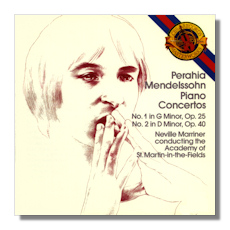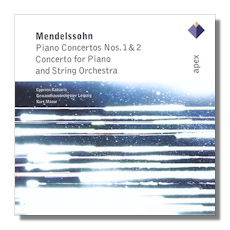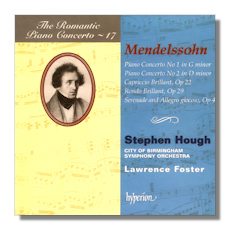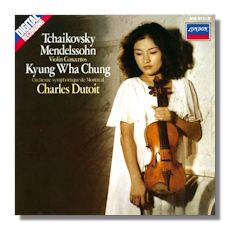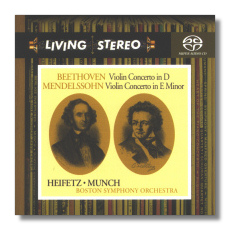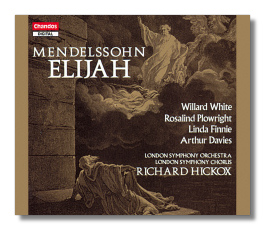
The Internet's Premier Classical Music Source
Related Links
- Recommended Recordings
Recommended Biographies
Recommended Scores
CD / DVD Reviews - Works List
by Douglas Briscoe - Audio Samples:
 (MIDI)
(MIDI) - Song Without Words,
Op. 30 #4
-
Find CDs & Downloads
Amazon - UK - Germany - Canada - France - Japan
ArkivMusic - CD Universe
Find DVDs & Blu-ray
Amazon - UK - Germany - Canada - France - Japan
ArkivMusic-Video Universe
Find Scores & Sheet Music
Sheet Music Plus -
Recommended Links
Site News
Felix Mendelssohn
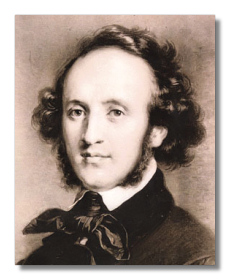
(1809 - 1847)
Mendelssohn's short life (February 3, 1809 - November 4, 1847) for the most part justified his name, Felix, which means "happy, lucky" and from which we get the word "felicitous." His life showed little of the storms that marked Beethoven's or the stresses of Berlioz's. Born into a wealthy banking family, the grandson of the great German Jewish Enlightenment philosopher, Moses Mendelssohn, Felix (later baptized Jacob Ludwig Felix) showed an early aptitude for music. Fortunately, he had parents willing to let him become a musician, and he received the finest training. His most prominent teacher was Carl Friedrich Zelter, advisor in matters musical to none other than Goethe. Zelter gave Mendelssohn thorough, but very conservative, instruction. Mendelssohn was encouraged to follow Bach and Mozart, but not Beethoven. Nevertheless, the boy found out Beethoven for himself and formed a deep appreciation and love of Beethoven's final period, particularly the middle and late piano sonatas, much to Zelter's puzzlement.
Mendelssohn's really early music (up to roughly 1824) is incredibly accomplished for a kid, but he began writing masterpieces around the age of 15, furthermore in an idiom largely of his own invention. Works of this period include the Harmoniemusik for band (1824), the Octet (1825), and the Overture to A Midsummer Night's Dream (1826). With these three pieces, he became one of the most important early Romantic composers. Mendelssohn's music blended Romantic sentiment and fantasy with a Mozartean economy, clarity, and poise. He became associated with a strand of composers that included Robert Schumann and reached its peak with Johannes Brahms. His exposure to Bach led to a fondness for learned counterpoint as well as to his conducting the St. Matthew Passion in 1829 – an immensely influential performance that took Bach out of the exclusive hands of specialists and into a more general public consciousness. He began to perform throughout Europe as a conductor and as a pianist to great success. In 1829, he made his first trip to England where his composing and playing found a rapturous audience. Indeed, one can say that Mendelssohn dominated English music in the 19th century as completely as Handel had done in the 18th. He made a tour of Scotland as well, where he began work on his Hebrides Overture (1832) and "Reformation" Symphony (1832). A tour of Italy inspired his "Italian" Symphony (1834), usually designated the Fourth Symphony, but actually written second.
However, even a genius needs steady work. Mendelssohn found it in Düsseldorf in 1833 and became director of music for the city. His oversight of sacred music led to performances of large choral works by Handel and Haydn and to an interest in trying an oratorio himself. The result, St. Paul (1836), proved immensely popular and established Mendelssohn firmly in the forefront of contemporary composers. Although less popular today, it is still considered a milestone in the development of the genre.
However, friction in Düsseldorf prompted Mendelssohn to look for other employment. The 1840s found him splitting his time between Berlin and, more importantly, Leipzig. Through his directorship of the Gewandhaus Orchestra and his establishment of a conservatory (1843), he quickly made Leipzig one of the major European musical centers, one which exerted significant influence throughout Europe and even the United States up to the early years of the Twentieth Century. He also continued to conduct, compose, and tour. Major works of this period include his String Quintet in B-flat (1845), the Violin Concerto in e-minor (1845), and the oratorio Elijah (1847), a rethinking in Romantic terms of the Handelian oratorio and one of the monuments of the choral repertoire.
The amount of overwork as well as the death of his beloved sister Fanny led to a series of strokes and finally death at the age of 38. Among the works left incomplete, we find fragments of a third oratorio, Christus, which arguably could have become his greatest, and an opera, Die Lorelei.
During his lifetime, Mendelssohn was regularly compared (with good reason) to Mozart. He won the championship of Robert Schumann. However, by the 1880s, his reputation, after such inflation, predictably began to sink. Wagner singled out Mendelssohn as an icon for decadence in his notorious essay "On Jewishness in Music." George Bernard Shaw, in a classic example of love-hate, made him the poster-boy for Victorian gentility. However, he praised the early music as that "of a very young composer astonishing the world by a musical style at once fascinating, original and perfectly new." In the Thirties the Nazis systematically tried to erase the composer from German music. The fact that Mendelssohn was baptized Protestant and that the family had converted in the 1820s (taking the name "Mendelssohn-Bartholdy," to distinguish themselves from all those lower-class Mendelssohns) made no difference, of course. Ironically, religion wasn't that big a deal to Mendelssohn himself. Despite his many sacred works, he generally approached the subject either as a practical musical matter or as drama. His conversion was more a matter of pleasing his father than anything else.
However, in the past twenty years, the composer has begun to attract new attention. The estimate of the chamber music especially has revised the composer's reputation upward. Writers have begun to see Elijah as an innovative and powerful fusion of oratorio and Romantic opera. Of course, certain works have long enjoyed the status of repertory staples: the octet, the Midsummer Night's Dream music, The Hebrides, Calm Seas and Prosperous Voyage, Ruy Blas and other overtures, Elijah, the "Italian" and "Scottish" symphonies. It's a rare professional violinist who doesn't know the e-minor concerto. Mendelssohn excelled in every genre except opera. Much of his catalogue remains little-known today, but much of it has made it to recording. Digging around a bit will reward the explorer. ~ Steve Schwartz
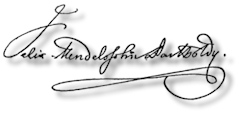
Recommended Recordings
 Andante & Rondo Capriccioso for Piano
Andante & Rondo Capriccioso for Piano
Sheet Music for this Piece
- Andante & Rondo Capriccioso, Op. 14; Piano Concertos; Variations Sérieuses/CBS MK42401
-
Murray Perahia (piano)
- Andante & Rondo Capriccioso, Op. 14; Caprices & Scherzi/Nimbus NIM5069
-
Martin Jones (piano)
Or Nimbus NI7704:
- Andante & Rondo Capriccioso, Op. 14/Chandos CHAN8326
-
Lydia Artymiw (piano)
Concertos for Piano
Sheet Music for this Piece
- Piano Concertos #1, Op. 25 and #2, Op. 40; Andante & Rondo Capriccioso; Variations Sérieuses/CBS MK42401
-
Murray Perahia (piano), Neville Marriner/Academy of St. Martin-In-The-Fields
- Piano Concertos #1, Op. 25 and #2, Op. 40; Concerto for Piano & String Orchestra/Teldec 9031-71104-2
-
Cyprian Katsaris (piano), Kurt Masur/Leipzig Gewandhaus Orchestra
Or Teldec 9031-75860-2:
Or Apex 89088-2:
- Piano Concertos #1, Op. 25 and #2, Op. 40/Chandos CHAN9215
-
Howard Shelley (piano)/London Mozart Players
- Piano Concertos #1, Op. 25; Symphony #4; Violin Concerto/Nimbus NIM5158
-
Christopher Kite (fortepiano), Roy Goodman/Hanover Band
- Piano Concertos #1, Op. 25 and #2, Op. 40; Capriccio brillant; Rondo brillant; Serenade and Allegro giocoso/Hyperion CDA66969
-
Stephen Hough (piano), Lawrence Foster/City of Birmingham Symphony Orchestra
 Concerto for Violin
Concerto for Violin
Sheet Music for this Piece
- Violin Concerto, Op. 64 w/ Tchaikovsky/London 410011-2
-
Kyung-Wha Chung (violin), Charles Dutoit/Montréal Symphony Orchestra
Or London/Decca Legends 460976-2:
Or Decca 452325-2:
- Violin Concerto, Op. 64 w/ Beethoven/RCA Victor "Living Stereo" Hybrid SACD 82876-61391-2
-
Jascha Heifetz (violin), Charles Munch/Boston Symphony Orchestra
Or on CD 68980-2:
- Violin Concerto, Op. 64 w/ Bruch/Deutsche Grammophon 400031-2
-
Anne-Sophie Mutter (violin), Herbert von Karajan/Berlin Philharmonic Orchestra
Reissued on DG "The Originals" 463641-2:
- Violin Concerto, Op. 64 w/ Beethoven/Sony 89505
-
Joshua Bell (violin), Roger Norrington/Camerata Salzburg
- Violin Concerto, Op. 64 w/ Saint-Saëns/Sony 89715
-
Cho-Liang Lin (violin), Michael Tilson Thomas/Philharmonia Orchestra
- Violin Concerto, Op. 64 w/ Bruch & Schubert/EMI Angel 749663-2
-
Nigel Kennedy (violin), Jeffrey Tate/English Chamber Orchestra
Elijah (oratorio)
Sheet Music for this Piece
- Elijah, Op. 70/Chandos CHAN8774/5
-
Rosalind Plowright (soprano), Linda Finnie (mezzo soprano), Arthur Davies (tenor), Willard White (bass), Jeremy Budd (boy soprano), Richard Hickox/London Symphony Orchestra & Chorus
- Elijah, Op. 70/Philips 432984-2
-
Thomas Allen (baritone), Yvonne Kenny (soprano), Anne Sofie von Otter (soprano), Anne Dawson (soprano), Jean Rigby (mezzo soprano), Anthony Rolfe Johnson (tenor), Kim Begley (tenor), John Connell (bass), Jamie Hopkins (boy soprano), Neville Marriner/Academy of St. Martin-In-The-Fields
- Elijah, Op. 70/Telarc CD-80389
-
Barbara Bonney (soprano), Henriette Schellenberg (soprano), Marietta Simpson (mezzo soprano), Florence Quivar (mezzo soprano), Jerry Hadley (tenor), Richard Clement (tenor), Thomas Paul (baritone), Thomas Hampson (baritone), Tim Gunther (baritone) Reid Bartelme (boy soprano), Robert Shaw/Atlanta Symphony Orchestra & Chorus
- Elijah, Op. 70/Carus-Verlag Hybrid Multichannel SACD 83.215
-
Letizia Scherrer (soprano), Werner Güra (tenor), Renee Morloc (alto), Michael Volle (bass), Frieder Bernius/Stuttgart Classical Philharmonic Orchestra & Chamber Choir
 Midsummer Night's Dream, Incidental Music
Midsummer Night's Dream, Incidental Music
Sheet Music for this Piece
- Midsummer Night's Dream: Overture, Op. 23 & Incidental Music, Op. 61/CBS MYK37760
-
George Szell/Cleveland Orchestra
- Midsummer Night's Dream: Overture, Op. 23 & Incidental Music, Op. 61/Philips 420653-2
-
Colin Davis/Boston Symphony Orchestra
- Midsummer Night's Dream: Overture, Op. 23 & Incidental Music, Op. 61/Philips 420653-2
-
Colin Davis/Boston Symphony Orchestra
- Midsummer Night's Dream: Overture, Op. 23 & Incidental Music, Op. 61/Philips 420653-2
-
Colin Davis/Boston Symphony Orchestra
 Octet for Strings
Octet for Strings
Sheet Music for this Piece
- String Octet in E Flat Major, Op. 20/Philips 420400-2
-
Academy Chamber Ensemble
- String Octet in E Flat Major, Op. 20/Sony SK48307
-
L'Archibudelli
- String Octet in E Flat Major, Op. 20/Hyperion CDA66356
-
Divertimenti
- String Octet in E Flat Major, Op. 20/London 421093-2
-
Academy Chamber Ensemble
Quartets for Strings
Sheet Music for this Piece
- String Quartets (Complete)/Deutsche Grammophon 415883-2
-
Melos Quartet
- String Quartets, Op. 12 & 13; Andante, Op. 81 #1 and Scherzo, Op. 81 #2/Hyperion CDA66397
-
Coull String Quartet
- String Quartets, Op. 44 #2, Op. 80 and in E Flat Major (1823)/Hyperion CDA66579
-
Coull String Quartet
- String Quartets, Op. 44 #1 & 3, Capriccio, Op. 81 # 3 and Fugue, Op. 81 #4/Hyperion CDA66615
-
Coull String Quartet
Quintet for Strings #2
Sheet Music for this Piece
- String Quintet in B Flat Major, Op. 87/Philips 420400-2
-
Academy Chamber Ensemble
- String Quintets, #1 Op. 18 and #2 Op. 87/Musicales Actes Sud M210001
-
Quintette Mendelssohn
Sonatas for Organ (1, 6)
Sheet Music for this Piece
- Organ Sonatas, Op. 65 #2, 3 & 6/Argo 414420-2
-
Peter Hurford (organ)
Songs Without Words for Piano
- "Lieder ohne Worte" (Complete)/Hyperion CDA66221/2
-
Lívia Rév (piano)
- "Lieder ohne Worte" (Selections)/London 421119-2
-
András Schiff (piano)
 Symphonies (3,
Symphonies (3,  4, 5)
4, 5)
Sheet Music for this Piece
- Symphony #3 "Scottish", Op. 56/Telarc CD-80184
-
Christoph von Dohnányi/Cleveland Orchestra
- Symphonies #3 "Scottish", Op. 56 and #4 "Italian", Op. 90/Deutsche Grammophon 415670-2
-
James Levine/Berlin Philharmonic Orchestra
- Symphony #4 "Italian", Op. 90/Deutsche Grammophon 410862-2
-
Giuseppe Sinopoli/Philharmonia Orchestra
- Symphony #4 "Italian", Op. 90/Virgin CDC59135
- Charles Mackerras/Orchestra of the Age of Enlightenment
- Symphonies #1-5/RCA Eurodisc 69237-2-RV
-
Celestina Casapietra, Peter Schreier, Adele Stolte, Kurt Masur/Leipzig Gewandhaus Orchestra, Leipzig Radio Chorus
 Trios for Piano, Violin & Cello
Trios for Piano, Violin & Cello
Sheet Music for this Piece
- Piano Trios, Op. 49 & 66/Vox Unique or Vox Box CD3X3029
-
Laredo-Robinson-Kalichstein Trio
- Piano Trios, Op. 49 & 66/Arabesque Z6599
-
David Golub (piano), Mark Kaplan (violin), Colin Carr (cello)
- Piano Trios, Op. 49 & 66/Deutsche Grammophon 410862-2
-
Giuseppe Sinopoli/Philharmonia Orchestra














